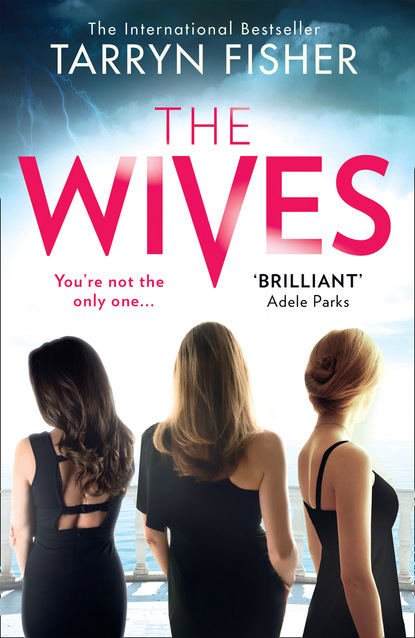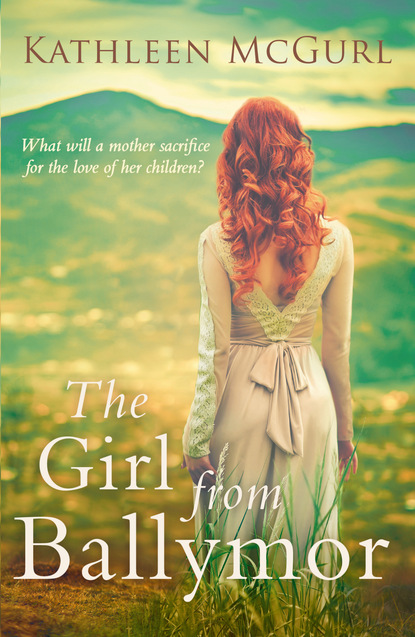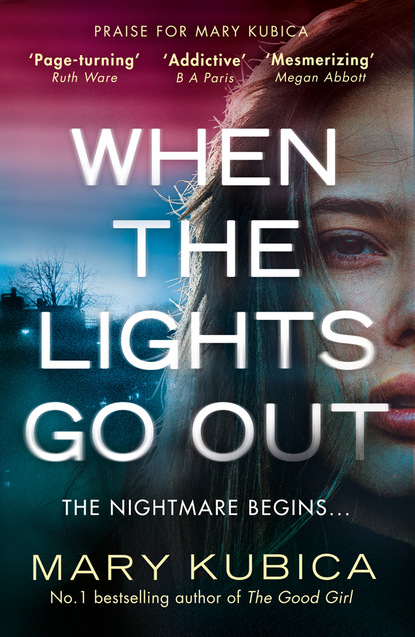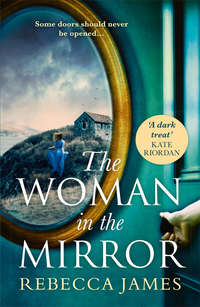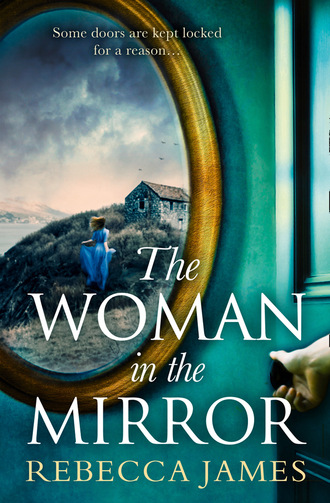
Полная версия
The Woman In The Mirror
‘Could I draw a dead fox?’ says Edmund.
‘You could if you wanted. But it’s rather morbid, don’t you think?’
‘But I could study it, in detail, then, as you say. It wouldn’t be able to get away from me. It wouldn’t be able to run away.’
‘True. But when you looked at your picture afterwards, you wouldn’t think of the fox as living, would you? You wouldn’t remember how clever you were to reproduce its detail as it rushed through the wood. You’d remember it as a body.’
‘And you’d hate to look at it,’ says Constance. ‘It would make you sad.’
‘I suppose,’ says Edmund. A neat frown puckers his childish brow. ‘But Father has his case of birds – those stuffed crows on the landing. They used to scare us, didn’t they, Connie? We’d run past them with our eyes shut in case they jumped out and pecked us! People like to look at those, and that’s the same thing, isn’t it?’
I spy a place for us to sketch, a soft clearing, surrounded by flora.
‘It depends on the person,’ I say. ‘Everybody likes different things. Hence the multiplicity of art.’
‘What does multiplicity mean?’
‘A big collection, full of variety.’
‘I’m going to draw a flower,’ says Constance.
‘That’s boring,’ says the boy.
‘In your opinion,’ I tell him. ‘And that’s what we’re talking about. Art is preference. Art is personal. Constance prefers the flower, while you prefer the fox. Neither is right or wrong. It’s about what you wish to see in the thing you’re looking at. Do you wish to observe a living soul, or do you wish to capture it?’
Edmund thinks about it for a moment. Then he smiles cunningly and says,‘May we draw you, miss?’
‘That isn’t really the object of the exercise.’
‘Alice is a pretty name,’ interjects Constance.
‘Thank you.’
‘I wish I were called Alice.’
‘Constance is lovely. It means for ever.’
‘That’s what Mummy used to say.’
The mention of their mother catches me off guard. Another detail, another candle held up to the frozen mist I hold in my mind. What did Mrs de Grey look like? Was she fair, like me, or dark like her husband? She must have been very beautiful, I think, to have such beautiful children and to have attracted a man like the captain.
It is a relief to reach the clearing, and to incite the children to sit and open their sketchbooks. Perhaps it is the ghost of Mrs de Grey still clinging to our collective mood, or perhaps it is the sheer sweetness of their faces as they gaze hopefully up at me, but before I know it I have agreed to Edmund’s request and am sitting opposite on a blanket, preparing to be drawn. ‘Wait—!’ calls Constance, and she jumps up and brings a daisy to me, which she threads through my hair.
‘There,’ she says, kissing my cheek. ‘Now it’s perfect.’
‘Be kind to me, won’t you?’ I say.
‘We’re always kind,’ says Edmund.
Chapter 7
New York, present day
Quakers Oatley Solicitors
St James House
Richmond Square
Mayfair
London W1—
Ms Rachel Wright
Apt 243E
West 27th Street, NY—
9 September 2016
Dear Ms Wright
Re: Winterbourne Hall, Polcreath, Cornwall
It is with regret that I write to inform you of the death of your aunt Constance de Grey, who passed away at her ancestral home in the early hours of Sunday morning.
I am conscious that this might come as something of a surprise, as I believe you were unaware of your connection with the Winterbourne Estate. Nonetheless, as the de Grey family solicitor, it is my duty to inform you that, being Miss de Grey’s next of kin, the park and all its land and contents now fall directly into your possession.
I would appreciate a swift response indicating how you would like to proceed. Under these circumstances, I normally advise a visit to our offices in London, where we can make the necessary inroads before granting you access to your inheritance.
Yours faithfully
Stephen Oatley, Esq.
Chapter 8
Rachel read the letter, then read it again. Her first thought was that it was a joke. She even looked about her, expecting a camera to be on her, or a crowd to appear, ready to laugh along. But her apartment was unchanged. Outside, the traffic droned on.
Her hands were shaking. Quickly she replaced the letter in its envelope, sitting down because her knees had turned to jelly. The envelope, that anodyne thing, seemed to pulse on the kitchen table. She folded it back out, looked again. Impossible. It was totally impossible. She searched for a clue to its falsehood; her mind tripped over a dozen hoaxes but none fitted with such an outrageous set of claims as this. And yet a voice whispered, It’s plausible, it might be, louder and more insistent each time.
Her phone rang. It was Paul. ‘Hey,’ he said, ‘guess what? The City wants to interview you, tomorrow at ten; I’ve booked you a spot at Jacob’s. Sound good?’
She was slow to reply, unlike her. ‘I don’t know, I…’
He was surprised at her reticence. ‘I can put them back, if you like?’
‘Listen, Paul,’ she said, making a decision, ‘I think you’ll have to. In fact, you can clear my schedule for the rest of the week. Next week, too.’
There was a pause. ‘Is everything OK?’
‘Everything’s fine.’ Rachel fingered the edges of the letter, half expecting it to vanish beneath her touch. ‘Something’s come up. Something important. At least, I think it is.’ She thought quickly. ‘I might have to go abroad for a while,’ she said, ‘I don’t know how long. You’ll look after things here, won’t you?’
‘Of course. But—’
‘Thank you. I knew I could count on you. I’ll call you later, OK?’
She hung up. Her apartment seemed changed, submerged, a place she wasn’t quite part of and could no longer stand to be in. As if it were a stage set, with cardboard walls and doors that led nowhere, and plastic pieces of fruit gathering dust in a bowl. She went to the park and walked and walked, and watched the people sailing past in their safe, happy worlds, with families and homes they had always known and loved, a hurrying, babbling stream while she remained a solitary rock, confounded by the noise and rush. All the while the letter glowed with promise in her pocket. She sat on a bench, waiting for her coffee to grow cold.
*
‘Are you sure it’s a good idea?’ said Aaron, when she told him that night.
She’d known he’d question her – he, who had two loving parents and an elder sister who called him ‘Rookie’ and sixteen cousins with who knew how many kids.
‘How will I know if I don’t give it a chance?’
He read the letter again. ‘It looks real,’ he said, with a shrug, turning the page over, as if the word FORGERY might be stamped on its back.
Oh, Rachel knew it was real. She’d spoken to Quakers Oatley Solicitors and the story stacked up. The firm had sounded relieved to hear from her, as if the de Grey estate were one it was seeking to move on from. She had conducted herself as if she were in a business meeting, arrangements, dates, agendas, plans; yes, she would travel to England; yes, she would visit the house called Winterbourne. But she didn’t tell them what she was hoping to find there – some clue to her past, some inkling, however faint, about where she had come from and the people who had made her. It was too much to hope for, wasn’t it? But there was hope, now, at least.
‘What about the gallery?’ Aaron asked. They were in his penthouse, a rooftop tower overlooking Central Park. The vodka in Rachel’s hand was mercifully robust. It had been a sober realisation that really, other than her colleagues, she had no one else here to inform of her intention, just him. ‘Seems like you’re just getting started,’ he said.
She was conscious at moments like these that Aaron wasn’t merely her lover: he was her investor. ‘I am,’ she replied. ‘A week or two away won’t change that. I’ll be online if I’m needed; in the meantime Paul takes charge, he’s more than capable.’
‘You think a week or two is all it’ll be?’
‘Honestly, I don’t know.’ She put down her glass. ‘It depends what I find. A rickety old house, most probably, and a bunch of junk that needs sorting.’
Privately, the thought of that junk containing just one photograph of a man and woman who might have been her parents, or her grandparents, or her aunt and uncle or cousins or anyone, really, made her flush with adrenalin.
‘Will you be OK in such a big place on your own?’ Aaron came to her and rested his forehead against hers, winding her fingers through his. They kissed; he smiled mischievously. ‘It looks kind of…foreboding. Like a haunted house.’
She laughed. ‘You believe in that stuff?’ she asked.
‘You might.’
‘I certainly don’t. Make-believe isn’t my thing.’
‘You don’t think we’re a bit make-believe?’
She frowned, amused. ‘How do you mean?’
‘We’re playing pretend, aren’t we? Pretending we’re together, but we’re not really, not properly. All I’m saying is that make-believe has its perks.’
‘I’m sure it does.’ Rachel reached for her drink, encouraging him to take a step back. ‘But I’m more interested in the facts at Winterbourne. This may be my only shot at finding them. How many adopted kids get a chance like this?’
‘I’m only suggesting you might want a little company while you’re out there.’
‘I’ll be fine,’ she said. ‘Creaks and bumps don’t scare me.’
He folded his arms, watching her affectionately. ‘What does, Rachel Wright?’
She finished the vodka, emboldened by it. ‘What kind of question is that?’
‘What does scare you? Because I’m wondering if Winterbourne represents a chance for you,’ he said, ‘to run away from what’s happened here, from real life.’ In that barefaced way of his, he struck her right where it hurt, forging on, heedless of her dismay. ‘Because you haven’t been happy, even I can see that, and by my own admission I don’t know you that well. Working all hours, pouring everything you’ve got into the gallery, barely pausing to breathe – it’s impressive, sure, and I was impressed by you the moment you walked into my office with a torch in your eyes that told me you’d stop at nothing to achieve it. But managing all that has meant you’ve been able to close other, more personal, doors, hasn’t it?’
Seeing her expression, he added, ‘I don’t want to speak out of turn—’
‘You have spoken out of turn,’ she said, coldly. ‘I’m not running away, Aaron. I’m running towards something. Something I’ve been trying for years to find.’
‘I know.’
‘You don’t know. You’ve never been able to get this. I need to see that place. I need to find out about where I came from, the people I came from, my mother, my father, I have no clue who they were. I’ll probably never know, now this last link is gone. But I have to go there, be there, touch it and feel it. I’ve thought of nothing else since I read that letter – and it goes back to way before then. I’ve thought about this, or some version of it, ever since I found out I was adopted. Finally I’ve got the chance at resolution. And once I find that resolution, I can come home.’
Aaron ran a hand through his hair. ‘You’ve been through a lot, Rachel.’
‘I know what I’ve been through.’
‘I don’t want to see you go through any more.’
‘You won’t. I’m going on my own. You won’t have to see anything.’
Perhaps she should have kept the whole thing to herself. She supposed that she had wanted to share it with someone. She had wanted to talk about it with someone because it was too big to take in on her own.
It was hard to think about the person she really wished to discuss it with. His wisdom, his good sense, his kindness, how he would have taken her in his arms… He had always been her first port of call, and Rachel liked that expression because it was true: he’d been the harbour for her little ship that had been bouncing alone on the tides for too many years. He had taken her in, given her shelter, and she’d put too much on him, of course she had, mistaking him for the whole family she lacked, so that when he left it wasn’t just a husband, someone she had hoped to have kids with. It was everyone. It was the past as well as the future. She missed him. Oh, she did.
‘I have to do this, Aaron,’ she said. ‘And frankly I don’t care what you think.’
He nodded. She waited. But the day Aaron Grewal apologised would be the day the sky fell in. ‘Let’s have tonight together, OK?’ he said instead.
She kissed him, an answer he seemed to accept. The future vibrated with nothing and everything, an empty, fearsome space, yet its promise was the closest she had held to her heart in as long as she could remember. Winterbourne would relinquish its secrets. And if it fought her, if it dared make her wait longer than she already had, she would force its mysteries to the surface through sheer dark grit. She was good at that.
Chapter 9
Cornwall, present day
Rachel didn’t like to delay once her mind was set. Twenty-four hours later she was boarding a train at Paddington, the key to Winterbourne safe in her pocket. She kept touching it, running her fingers over its ancient contours. It looked like a key that could open another world, the key to a trapdoor in the ground, beyond which strange creatures roamed and slept, and the sun rose at dusk and the moon rose at dawn.
A woman sat opposite her with a young girl. The girl was applying nail stickers, her focus entire. The woman flipped out a magazine, its cover detailing minor celebrities on vacation, with the headline SKINNY AND MISERABLE!
The train eased from its platform and a voice announced: ‘Welcome to this South West Trains service to Penzance, calling at…’ Rachel reached for her tablet and checked her mail, but it was no good, she couldn’t focus. Instead she looked through the window. It took a while to chug out of London, past the terraces under their drab grey sky, and the motion of the train made her tired. She hadn’t slept on the plane, had barely rested or stopped since she’d opened the letter, and she put her head back now and tried to relax. Each time she closed her eyes, she saw the faces of the two solicitors at Quakers Oatley, sitting opposite her, their expressions by turns fascinated and grave. She had been Alice in Wonderland, tumbling down the rabbit hole, and they were as captivated by her as she was by them. These gatekeepers were about to change her life, everything she had ever thought about herself, every presumption overturned. Her instinct about their being keen to move the case on had been right. Rachel had the impression that Winterbourne was an albatross for them and they welcomed the chance to get rid of its legacy. ‘We weren’t sure we’d be able to find you,’ the woman had said, adjusting her papers in the prim, efficient manner of one pleased at their own good luck, ‘or, if we did, what your reaction would be.’
The man had run through what they knew. Rachel craved more, each answer insufficient, each explanation scattered with holes. She yearned for the names of her mother and father but was left wanting. Her grandfather was identified as a Captain Jonathan de Grey, making Constance, as the letter made clear, Rachel’s aunt. But there was no grandmother. ‘What about the captain’s wife?’ she’d asked, scouring the scant family tree as the solicitors looked apologetically on. ‘That was her, right?’ But the man shook his head. ‘Your mother,’ he said gently, ‘had different parentage…’
It was his way of saying that Captain de Grey had gone elsewhere, and that Rachel’s mother had been born a bastard as a result of his affair. But who had she been? Who was the poor woman who had given birth to Rachel in a London hospital, looked into her baby’s eyes and decided to give her up? Allegedly Constance had been the only person who knew about Rachel, and about this American orphan’s connection to her family. Why hadn’t Constance sought to find her? Why hadn’t she spoken out? Rachel tried not to feel bruised, but it was hard. All her life she had felt fundamentally rejected, and even at the threshold of this incredible discovery that same rejection snapped at her heels. Her aunt had known of her and done nothing, content to let Rachel unearth whatever truths were left behind after she’d died. It didn’t make sense. More questions, more uncertainties: it seemed the more Rachel learned, the more clueless she grew.
When she asked about Constance, the glance the solicitors exchanged implied that she hadn’t been an easy woman. Rachel told herself that, for all the romance and surprise of Winterbourne just falling into her life like a first drift of January snow, she couldn’t for a moment imagine a fairy-tale ending. All her life she had invented pictures that made sense to her – that her birth mother had been unable to cope, or that Rachel had been taken against her will, or that someone had forced her mother to give her up – and there was safety in those knowable limits. Now, every version she’d held dear exploded. It all came to this: this house, this family, and these doubts she might never be able to assuage. Quakers Oatley had dealt with the de Greys for years, but they didn’t know how Rachel fitted in – only that Constance, on her deathbed, had made an assertion that turned out to be true.
It seemed alarmingly easy to inherit one of the country’s grandest estates. Rachel signed documents, provided identification and settled a fee.
In return: a key.
‘The only one,’ said the woman, before letting it go, and Rachel felt the sheer weight of it in her hand and wondered how many had held it in years gone by. It occurred to her that the key was the only thing she had ever touched that her mother, too, might also have touched – apart from herself, of course: her own skin.
She must have dozed because the next thing she knew they were rolling through unbroken countryside and the sun was setting over the hills. The woman opposite and her daughter had gone. Rachel’s carriage was empty.
‘Excuse me,’ she asked a steward on his way past, ‘where are we?’
‘Next stop Polcreath,’ he told her.
She sat back and watched the blackening landscape.
*
Dusk was nearly complete by the time they pulled into the station. The platform was empty apart from a man on a bench, his head tucked into the collar of his coat, and a couple of passengers who had disembarked with her. A sign read TAXI and Rachel followed it out to the road, where a car was parked with its headlights on. She went to the window and named her destination. The driver seemed surprised.
‘You sure?’ he said. ‘I thought it was derelict. No one’s lived there in years.’
‘My aunt lived there.’ It felt wonderful to say it. My.
‘Climb in, then.’
She was hoping he wouldn’t talk. But: ‘You American?’ he asked.
‘Yes.’
‘Where from?’
‘New York.’
‘So what brings you here? Winterbourne Hall’s not much of a tourist destination.’
‘Like I said, I have family here. Had. My aunt died recently.’
‘I’m sorry to hear that.’
Rachel sat back, handling the key once more in her pocket. It felt warm, as if radiant, shimmering in anticipation of reaching home.
‘I expect you’ve got lots to sort out, then,’ said the driver, folding a stick of gum into his mouth. He looked at her in the rear-view mirror.
‘What do you mean?’
‘Well, family affairs and the like. After someone dies. You know.’
‘Yes. Yes, I have.’
‘You’ll be staying a while?’
‘As long as it takes.’
‘There’re people round here that can show you around, if you like.’
‘I’ll be fine. But thank you.’
‘Always friendly faces in Polcreath, you’ll see. And if you’re really short on company, I’m in the Landogger Inn most nights.’
‘I’ll bear that in mind.’ But he’d said it with a twist of humour, which she returned. ‘The Landogger – that’s an unusual name.’
‘Named after the cliffs,’ he said, ‘right by Winterbourne. They’ll surround you. Lethal they are, too: a sudden drop. The house is right on the Landogger Bluff.’
‘You seem to know a lot about Winterbourne.’
‘Not much. Just that for those of us who’ve been in Polcreath all our lives, it’s the stuff of legends. Always there, you know, there on the hill, but no one ever goes.’
‘You must remember my family.’ It was a difficult thought, the idea that this man, friendly though he was, had been closer to her ancestors than she would ever be – that he might have seen them, heard their voices, and maybe even met them. She didn’t know how to feel as the cab drew closer to Winterbourne. A ripple of frustrated anger obscured any sense of homecoming. She wanted to know why she’d been dismissed and forgotten about: why her whole family, it seemed, had cast her aside.
‘I never met them,’ the driver said. ‘They were, and I don’t mean no offence by this, curious. Liked to keep themselves to themselves. I’m going way back now, to the sixties, when I was a boy.’ Rachel could tell by his voice that he liked the memory. ‘The de Grey children… Well, isn’t that a posh name? They weren’t children any more by the sixties, of course, but they stayed on at Winterbourne, a lad and a woman, coming up for thirty, they were. People said there was something funny about the lad, that he was gone in the head. I always thought it was odd, even then, that they should have remained at the house, unmarried, with no families of their own. It was as if they were married to each other. But listen to me, just an idle gossip, talking about your people like I knew them myself.’
He met her gaze in the mirror and she was thankful night was falling. She didn’t want him to see the naked truth: that these were mysteries she could not yet answer. That he, an ‘idle gossip’, knew more about her family than she did.
‘Are we close?’ Rachel said.
‘Not far now,’ he replied. ‘Not far at all.’
*
It was, in fact, another half an hour, and by the time they reached the Winterbourne gates the night outside was pitch black. They’d left the last settlement many miles ago, and the house was so alone and remote that not one light of civilisation could be seen anywhere across the black, boundless moors. The only glow was the glow of the moon, which hung above them like a marble, throwing the sea into glittering grey.
As Rachel stepped out of the cab, glad of its reassuring interior bulbs and the familiar hum of its engine, she looked above at the sky. The stars were immense. Stars like this didn’t exist above New York. Exotic words surfaced in her mind – Cassiopeia, Betelgeuse, Europa. She must have learned them long ago and forgotten, or else had little reason to remember, but here, beneath the vast beauty of space, the stars appeared to her as jewels, unfathomably rare and precious.
‘You sure you’ll be all right?’ The driver leaned over as she got out. ‘There’s a warm bed at the Landogger, I’ll bet. I can always take you back there.’
Rachel shook her head. ‘I’ll be fine.’ Winterbourne was hers, after all. Staying here alone might be a foreboding prospect, but she felt as if the house and its ghosts had thrown her a challenge. She had been held back for too many years, against her will, ignorant of its existence, robbed of her choice, letting the years drain out like bath water. She had a choice now, and she’d never find answers if she ran away.
She paid the driver and watched his tail lights disappear into the night. She turned to the mansion, her eyes travelling up its enormous façade, whose shape, in the darkness, she could barely decipher. It loomed, shadow-like, amorphous and huge, a lake of black except where the moonlight caught it and a detail could be glimpsed, like the snap of glass in a window or the gnarled arm of a tree. She regretted her decision – although it hadn’t been conscious, just the way things had worked out – to arrive so late. It’ll be better in the morning, she told herself, bracing herself against the long night ahead. Wait for the daylight. She could hear the roar of the sea against the Landogger cliffs, the foam and spit of it as it churned against rocks.


